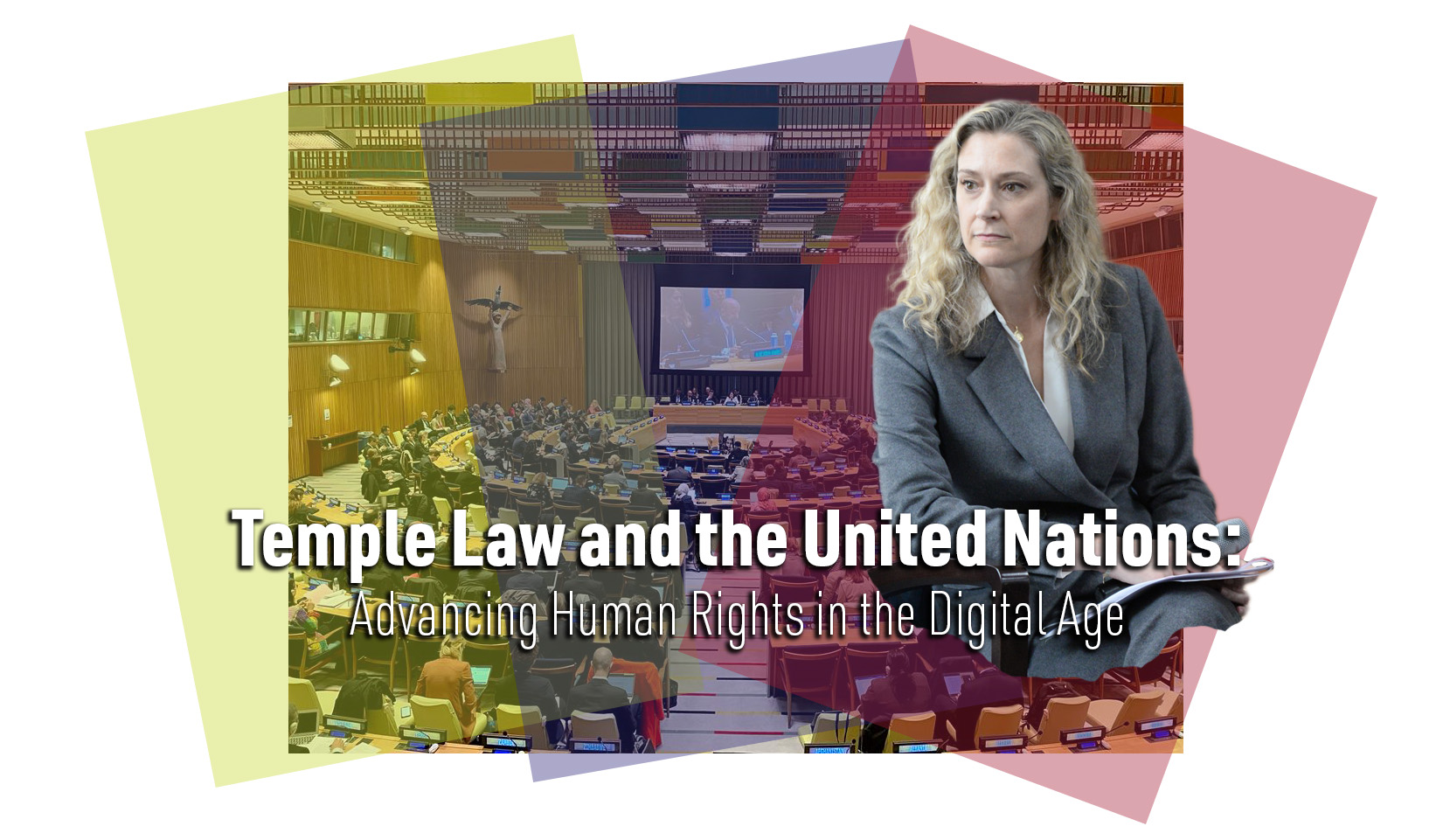
Advancing Global Standards for Digital Public Infrastructure: The Role of Temple Law’s iLIT
This article is the third in a series spotlighting Temple Law School faculty who are shaping law and policy on an international scale. Through roles with the United Nations and other global initiatives, these scholars are turning legal theory into practice to address pressing global challenges.
The Institute for Law, Innovation & Technology (iLIT) at Temple Law School focuses on critical legal issues in human rights and surveillance, public interest technology, emerging cybernorms and platform and AI accountability. Through research, policy development, and education, iLIT provides students and faculty opportunities to lead in addressing these complex challenges. iLIT’s defining mission is to promote more equitable and inclusive governance of digital technologies, starting with crafting educational and career pipelines for diverse students to access and thrive in tech policy roles.
Leading iLIT’s mission is Professor Laura Bingham, an expert in global migration law, human rights, and the interplay of law, justice and technology. As iLIT’s Executive Director, Professor Bingham has spearheaded initiatives that bridge research and advocacy to press for legal and governance guardrails in an emerging digital policy agenda in international development and humanitarian assistance, known as digital public infrastructure (DPI). DPI has no fixed definition but generally refers to the digital systems, tools, and frameworks that enable core societal functions, including digital identity systems, digital payment platforms, and data-sharing networks.
The Promise and Perils of Digital Identity Systems
Digital identity systems—a foundational element of DPI—allow individuals to verify their identity, granting access to services such as healthcare, banking, and social programs. Increasingly reliant on biometric data like facial recognition or fingerprints, these systems promise efficiency and inclusion but also present significant risks, including privacy violations, discrimination, and exclusion of marginalized groups.
“Digital identity systems are critical to many current models for the modern digital economy, but they come with inherent risks and assumptions,” Professor Bingham said. “iLIT’s work focuses on surfacing and critically examining those assumptions, developing safeguards through global coalitions, support to national litigation efforts, and research that shapes international frameworks.”
Building Global Coalitions and Frameworks
iLIT collaborates with civil society organizations worldwide to address DPI governance, privacy and surveillance, and inclusion and non-discrimination concerns. Through initiatives like the Advanced Access to Justice Clinic, students engage directly in projects that promote human and civil rights in digital identity systems. By contributing to research, local policy engagement, and litigation strategies, iLIT supports community-based groups and civil society working to address discriminatory or exclusionary digital policies.
Throughout 2024, Bingham served in a United Nations working group convened in the lead up to the UN Summit of the Future to draft a Universal DPI Safeguards Framework. The Safeguards Framework was released in September and aims to ensure that DPI adoption respects human rights and includes strong mechanisms for fairness, accountability and redress. “The Safeguards Framework was consciously designed to translate into adoption by the key decisionmakers contemplating, building and maintaining DPI,” Professor Bingham noted, “this effort provides all stakeholders with important tools to press for positive, progressive changes to the governance structures that have left too many people out of the design process, and serves as a foundation for more open and inclusive dialogue about DPI governance in the future.”
Research and Advocacy in Action
A key project at iLIT involves mapping national legislation related to digital identity systems. Student fellows analyze how countries regulate digital identity systems, focusing on privacy, accountability, and discrimination. This research supports a global coalition of civil society organizations focused on these issues in their respective contexts, and informs advocacy efforts across borders.
“iLIT provides research capacity for those leading the coalition work,” Bingham said. “We prioritize the use of our time to serve as back-end support and contribute resources to fill in gaps where individual organizations identify unmet strategic research needs.”
Addressing U.S. Policy Challenges
The foundational concepts and real-life implementation of DPI took root outside of the United States, predominantly in emerging economies like India and Brazil. Unlike the vast majority of countries in the world, the U.S. doesn’t have a national ID, let alone a mature, trusted digital identity ecosystem. Not surprisingly, the U.S. has not been vocal in the genesis of the DPI Safeguards Framework and has not pushed forward with a domestic DPI governance and regulatory agenda. The United States lags in some of the most foundational regulatory elements of DPI Safeguards, including strong privacy and data protection frameworks and robust anti-discrimination laws. Recent Supreme Court rulings have weakened privacy rights and fragmented legal remedies for discrimination.
Efforts to enact a comprehensive federal privacy law have repeatedly failed. “The U.S. must prioritize building institutional structures to protect constitutional democracy and individual rights,” Professor Bingham said. “Without strong oversight mechanisms, we risk undermining trust and transparency in any public digital systems the government contemplates introducing in the future. One thing we’ve learned the hard way is that without public trust, society-wide digital infrastructure projects tend to collapse, making it even hard to win people over the next time around.”
Shaping a Just Digital Future
By influencing policy and advocating for rights-based approaches, iLIT is helping shape the digital economy to serve societal needs equitably.
“For me, it comes down to the rule of law, institutional legitimacy, and access to justice,” Professor Bingham said, “we need to be satisfied that a system respects and even strengthens these imperatives in society.”
